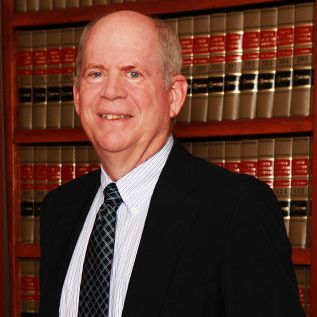Meet Stephen P. Will
Meet Stephen P. Will, a partner at Davies, Barrell, Will, Lewellyn & Edwards, PLC. He has been with the firm since 1976.
What types of law do you practice?
Primarily, I practice real estate transactions and wills and estate planning.
How did you choose these practice areas?
This evolved. When I first started practicing at this firm, each individual attorney was a general practice attorney, and I handled just about every kind of law from criminal practice to domestic relations practice to PI work, although my primary emphasis from the beginning was on real estate practice and limited areas of estate planning. The firm transitioned from having a group of general practitioners to a group of more specialized attorneys so that we each could develop more expertise in certain areas. We took a team approach so a client who needed assistance in another practice area would be referred to another partner who specialized in that area. This model, we found, is optimal for our clients.
I concentrated on the non-litigation areas, increasing the wills and estate practice and continuing to do the real estate transactions. What I enjoy most is working with clients and, in both of those areas, there is a lot of hands-on contact with clients in a relatively non-controversial arena. Most of our practice serves from a team setting, myself and the staff providing the service, and our goal is to make the people who are receiving those services accomplish their goals without experiencing a lot of stress and difficulty.
Have you seen changes within the real estate practice or the wills and estates practice in recent years?
The real estate practice has changed drastically from the early days, largely through government regulation and banking requirements. There is no longer any such thing as a really, truly, simple closing. The volume of paperwork for a normal closing has increased eight- or ten-fold from the time I started practicing. Delays in getting loan approvals have increased and requirements for loans have become much stricter, obviously because of the financial crisis from 2007.
A client who has gone through the process previously will notice that it is more burdensome now. Formerly, most of our closings were held with local banks being the lenders, with very limited paperwork for the closing, and generally dealing with a bank with which clients already had a relationship. We have now transitioned into a mortgage world where the lenders are not necessarily even local; they are scattered throughout the country and there are a lot more of them. The client is now a number and lenders are no longer relying on prior track records other than credit scores. Lenders are looking at scores strictly from the eyes of an underwriter, trying to determine whether or not a client fits into their condition for a loan closing.
What about wills and estates? Has that practice grown?
I do think more people are doing wills. There is probably more education and recognition out there about the importance of wills and estate planning. People are being encouraged to get their ducks in a row before they need them. Others have experienced what happens when estate planning is not done and they don’t want to put that burden on their children.
I’d say the driving force for estate planning is about an orderly transition of your assets at your death. I do think that anyone who has a family with children and any real form of assets probably needs an estate plan regardless of age. This includes advanced medical directives, healthcare powers of attorney, general powers of attorney, and a complete plan so that there can be an orderly transition at your death to your beneficiaries at the least cost possible.
What is the most rewarding thing about being an attorney?
The ability to provide assistance to clients and get them through what could otherwise be a tough time. For example, we try to keep the real estate closings pleasant and non-complicated, but there are always issues that come up and we try and handle those as easily as possible with less stress on our clients. Estate planning is generally done when there are not a lot of immediate issues but they are planning for the future. Estate administration, however, is the opposite. Then there is often the loss of a loved one so there are emotional as well as legal issues. It is rewarding to us when things are done and done correctly and the client appreciates the services we have provided.
Also, I have a lot of loyalty to Culpeper; it’s rewarding to me to do work that benefits members of this community. I am fortunate to have grown up here. I was born and raised in Culpeper, attended Culpeper High School, went to Virginia Universities (Virginia Tech for a Bachelor’s degree, UVA for a Law degree), and then returned home. I had clerked at this firm during law school and came directly to work here after graduating. I’ve practiced law here for forty years. So, I do know Culpeper. I know the people who are from here and I meet the people who are moving here and are eager to become part of our community. It’s very rewarding to me when we’ve done work for a client and then they return to see us again to assist with another legal issue. It’s evidence that we are doing the right thing and our clients appreciate our efforts on their behalf.
What advice do you have for someone who is looking for a lawyer?
I think the best way to judge a lawyer’s ability is by getting first-hand comments from people who have used their services before. There are lots of ways to find lawyers today – social media, Facebook, phonebook, Yellow Page ads – but the best way to pick an attorney is to find someone who has had personal representation from that attorney previously and see what they have to say about the attorney.
Categories:


![Crash Reported on Rt 729 Near Alum Springs Rd [FREDERICKSBURG, VA]](https://www.dbwle.com/wp-content/uploads/2024/08/beh-scaled.jpg)






![Vehicle Fire Closes Section of Butler Road [FREDERICKSBURG, VA]](https://www.dbwle.com/wp-content/uploads/2024/08/mick.webp)
